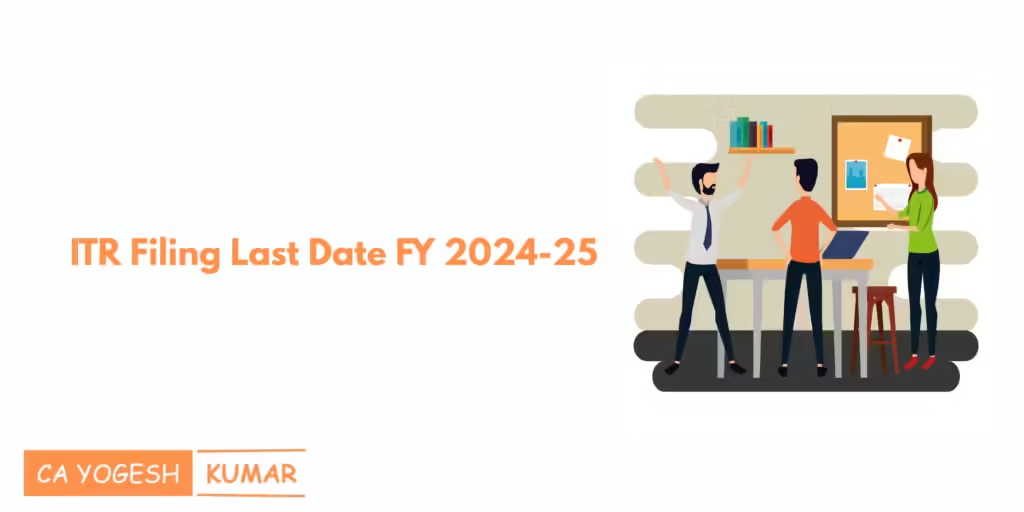
Filing Income Tax Returns (ITR) on time is crucial for every taxpayer to avoid penalties and comply with tax regulations. For Financial Year (FY) 2024-25, the Assessment Year (AY) 2025-26 follows immediately, meaning taxpayers must file their returns before the due date to avoid interest, penalties, or legal repercussions.
At ADY & Co. Chartered Accountants, we understand the complexities of tax filing and provide comprehensive guidance for businesses and individuals. If you are looking for an experienced CA in Delhi, our team, led by CA Yogesh Kumar, is here to help you navigate tax compliance effortlessly.
ITR Filing Deadlines for FY 2024-25 (AY 2025-26)
The due dates for different taxpayers vary depending on their category. Below are the key deadlines for ITR filing:
1. Individuals and Non-Audit Cases
- Due Date: 31st July 2025
- Applicable To: Salaried individuals, self-employed individuals, and businesses not requiring an audit.
2. Businesses & Professionals Requiring Tax Audit
- Due Date: 31st October 2025
- Applicable To: Businesses with turnover exceeding prescribed limits under Section 44AB.
3. Companies and LLPs Under Audit
- Due Date: 31st October 2025
- Applicable To: Companies and Limited Liability Partnerships (LLPs) requiring an audit.
4. Transfer Pricing Cases
- Due Date: 30th November 2025
- Applicable To: Entities involved in international transactions requiring transfer pricing reports.
Filing after these dates will attract penalties under Section 234F, late fees, and interest under Section 234A, 234B, and 234C.
Why Timely ITR Filing Is Important?
Filing your ITR on time has multiple benefits:
- Avoid Penalty & Interest: Late filing can lead to penalties up to ₹10,000.
- Smooth Loan Approval: Banks require ITR documents for loans.
- Claim Tax Refunds: Timely filing ensures quicker refunds for excess tax paid.
- Avoid Notices from IT Department: Non-compliance can attract scrutiny from tax authorities.
- Carry Forward Losses: Losses from capital gains and business can be carried forward only if the return is filed on time.
How to File ITR for FY 2024-25 (AY 2025-26)?
Filing your ITR can be done online through the Income Tax e-filing portal. Here’s a step-by-step process:
Step 1: Gather Required Documents
Ensure you have the following documents ready:
- PAN Card & Aadhaar Card
- Form 16 (For Salaried Employees)
- Bank Statements & Salary Slips
- Investment & Deduction Proofs (Under Section 80C, 80D, etc.)
- Business Profit & Loss Statements (For Business Owners)
Step 2: Select the Right ITR Form
Choosing the correct ITR form depends on your income source:
- ITR-1 (Sahaj): For individuals with salary, one house property, and income up to ₹50 lakh.
- ITR-2: For individuals and HUFs with income from capital gains or multiple house properties.
- ITR-3: For professionals and business owners.
- ITR-4 (Sugam): For those under the presumptive income scheme.
Step 3: Log in to the E-Filing Portal
- Visit www.incometax.gov.in
- Use your PAN as the user ID to log in.
Step 4: Fill in the Details
- Enter your income, deductions, and tax liability.
- Verify pre-filled information.
- Claim refunds if applicable.
Step 5: Verify and Submit the Return
- E-verify using Aadhaar OTP, Net Banking, or DSC.
- Download the acknowledgment for future reference.
Common Mistakes to Avoid While Filing ITR
- Selecting the Wrong ITR Form: Leads to defective return notices.
- Not Reporting All Income Sources: Interest from FDs, rental income, or foreign income must be included.
- Mismatch in 26AS and ITR: Cross-check tax deductions with Form 26AS.
- Failure to Verify ITR: An unverified return is treated as not filed.
How ADY & Co. Chartered Accountants Can Help You?
At ADY & Co. Chartered Accountants, we offer expert tax consultation services to ensure hassle-free filing. Whether you need assistance with ITR filing, business registration in India, foreign company registration in India, or registering a company in the USA from India, our team of experts is here to help.
Frequently Asked Questions (FAQs)
-
What are the consequences of missing the ITR filing deadline?
Failing to submit your Income Tax Return (ITR) on time may invite a financial penalty of up to ₹10,000 as per Section 234F of the Income Tax Act. Additionally, interest charges accrue on the outstanding tax liability, amplifying the financial burden.
-
Is it possible to amend my ITR after submission?
Certainly. If any discrepancies or errors are discovered post-filing, taxpayers have the opportunity to rectify them by submitting a revised return. This amendment can be made until the conclusion of the assessment year, i.e., March 31, 2025.
-
Are salaried professionals required to file an ITR?
Yes, individuals earning a total income surpassing ₹2.5 lakh in a financial year (₹3 lakh for senior citizens) are obligated to file an ITR as per the Income Tax Act.
-
How can a foreign entity establish its presence in India?
International enterprises seeking to operate in India can register as a subsidiary, liaison office, or branch office. The registration process requires compliance with regulatory formalities, which can be streamlined with the expertise of ADY & Co.
-
Where can I locate a proficient Chartered Accountant for tax filing near me?
For expert tax consultation and seamless ITR filing services, ADY & Co. Chartered Accountants, under the stewardship of CA Yogesh Kumar, stands as a preeminent firm in Delhi, offering comprehensive tax solutions with precision and reliability.